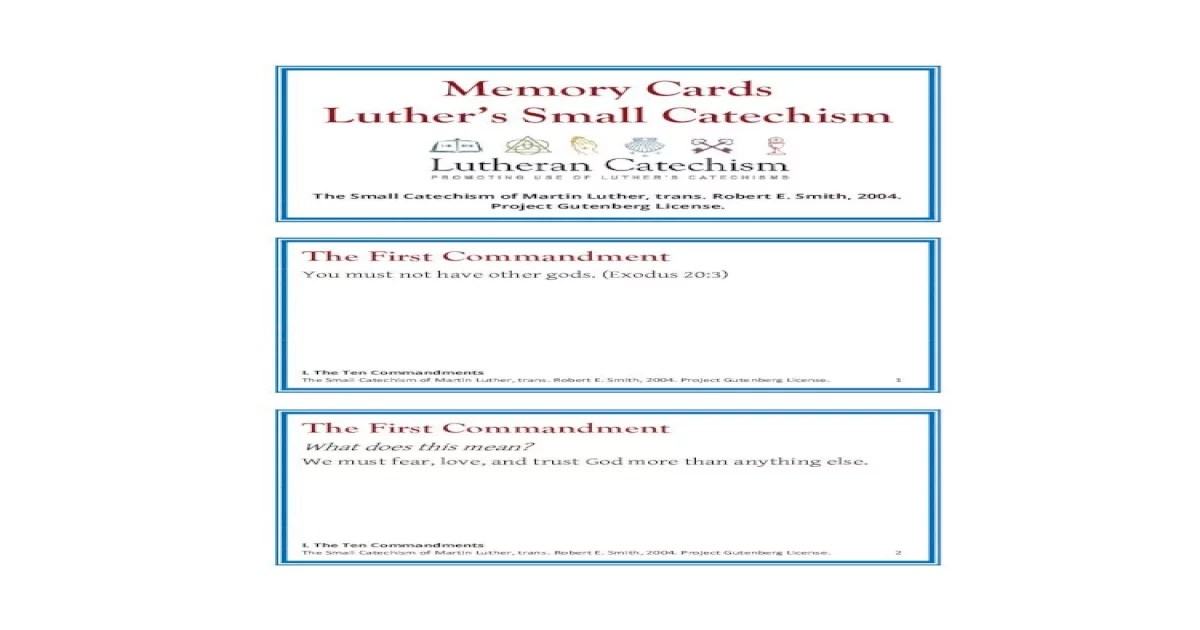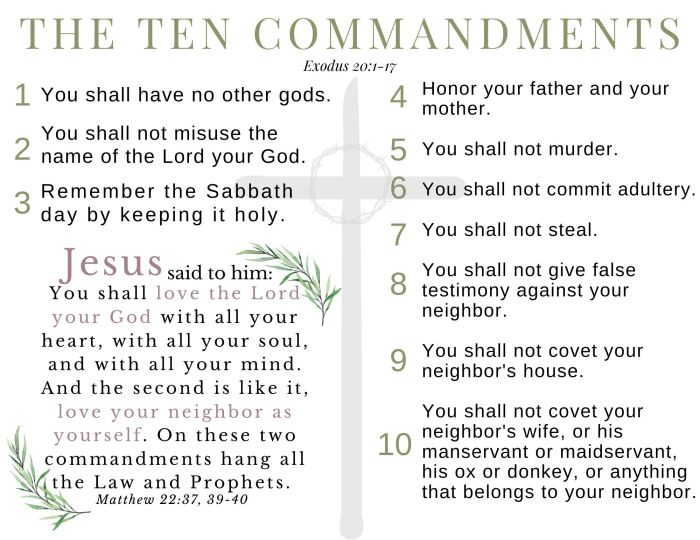Ten commandments luther’s small catechism – The Ten Commandments in Luther’s Small Catechism, a foundational text of the Lutheran faith, provide a comprehensive framework for understanding God’s moral law and its implications for daily life. This catechism, composed by Martin Luther in the 16th century, has played a pivotal role in shaping the spiritual and ethical formation of generations of Christians.
The Ten Commandments, as presented in the Small Catechism, are not merely a list of prohibitions but a roadmap for righteous living. They reveal the nature of sin, the need for grace, and the path to salvation. By examining the significance and interpretation of each commandment, we gain insights into the moral standards established by God and the transformative power of his love.
1. Introduction: Ten Commandments Luther’s Small Catechism

Martin Luther’s Small Catechism is a concise and influential summary of Christian doctrine, written in 1529. It was intended as a guide for teaching the basic tenets of the Lutheran faith to children and adults alike.
The Ten Commandments form a central part of the Small Catechism, serving as a moral foundation for Christian living. They were originally given to Moses on Mount Sinai and have been a cornerstone of Judeo-Christian ethics for centuries.
2. The Ten Commandments in the Catechism
The Ten Commandments are presented in the Small Catechism in two forms: a brief summary and an expanded explanation.
- Summary:“We should fear and love God and trust in Him above all things.”
- Expanded Explanation:The Commandments are divided into two tables, the first five dealing with our relationship with God and the remaining five with our relationship with our neighbor.
3. The Meaning and Interpretation of the Commandments
Each of the Ten Commandments carries a specific meaning and significance:
- First Commandment:Prohibits idolatry and demands exclusive worship of God.
- Second Commandment:Forbids misusing God’s name in blasphemy or false oaths.
- Third Commandment:Requires the sanctification of the Sabbath.
- Fourth Commandment:Emphasizes honoring parents and authority figures.
- Fifth Commandment:Prohibits murder and violence.
- Sixth Commandment:Condemns adultery and sexual immorality.
- Seventh Commandment:Prohibits stealing and dishonest practices.
- Eighth Commandment:Forbids lying, slander, and false witness.
- Ninth Commandment:Prohibits coveting our neighbor’s possessions.
- Tenth Commandment:Condemns covetousness and the desire for what belongs to others.
4. The Commandments and Salvation

The Ten Commandments play a crucial role in the Lutheran understanding of salvation:
- Reveal Sin:The Commandments expose our sinfulness and inability to meet God’s perfect standards.
- Point to Grace:By recognizing our sin, the Commandments drive us to seek God’s grace and forgiveness through faith in Jesus Christ.
- Guide Sanctification:While we are not saved by keeping the Commandments, they provide guidance for living a holy and righteous life.
5. The Commandments in the Life of the Church

The Ten Commandments are central to the worship and teaching of the Lutheran Church:
- Worship:The Commandments are recited during the liturgy and serve as a reminder of God’s moral law.
- Catechesis:The Commandments are taught to children and adults as a foundation for Christian living.
- Pastoral Care:The Commandments are used in counseling and pastoral care to guide individuals in their moral decision-making.
6. The Commandments in Society

The Ten Commandments have had a profound impact on Western society and culture:
- Legal Codes:The Commandments have influenced the development of laws and ethical principles.
- Social Norms:They have shaped societal values and expectations for moral behavior.
- Artistic Inspiration:The Commandments have been a source of inspiration for art, literature, and music.
Essential Questionnaire
What is the purpose of the Ten Commandments in Luther’s Small Catechism?
The Ten Commandments serve as a guide for Christian living, revealing God’s moral law and the standards of conduct he expects from his followers.
How are the Ten Commandments structured in the Small Catechism?
The commandments are divided into two tables: the first table focuses on our relationship with God, while the second table addresses our responsibilities towards our neighbors.
What is the significance of the Ten Commandments for salvation?
The commandments reveal our sinfulness and the need for God’s grace. They point us to the need for repentance and faith in Jesus Christ, who fulfills the law on our behalf.